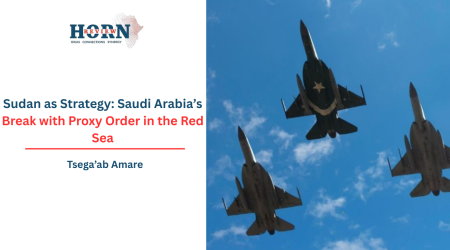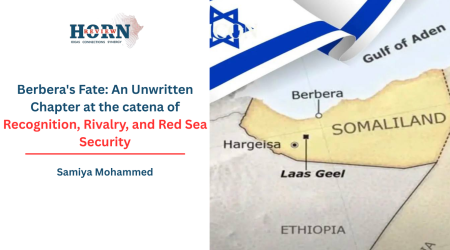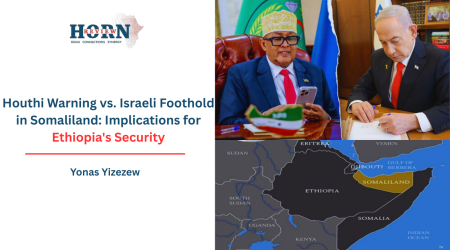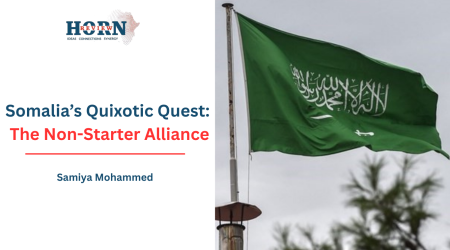
15
Nov
Ethiopia Geoeconomizes, Egypt Geopoliticizes: The Horn and Broader Red Sea
In a world that seeks balance, the Horn of Africa and wider Red Sea regions yearn for new answers to address the perils of this momentous era. Egypt’s responds to such changing vital spaces of the world through geopolitical interventions while Ethiopia capitalizes on geoeconomic connectivity. Egypt’s approach has for so long made these strategic regions geopolitically hot and geoconomically dormant so as to preserve its regional primacy over water and seas. Ethiopia’s approach makes inroads in reshaping these geopoliticised and geoeconomically disregarded sites into useful and relevant geoeconomic spcaes through connectivity and corridors.
The modern structure of the regional power system and normative order of the hydro politics of the Nile Basin formerly organized by the 1929 Pax Britanica and lately refashioned with the 1959 Nasser’s Pax Arabica has come to an end with the inauguration of the Grand Ethiopian Renaissance Dam (GERD) laying a new geoeconomic leaf for these regions. Ethiopia’s GERD is more about thinking, acting and inventing the Africa we want as Africans stand to re-merge in the new era to independently think, develop and integrate their economies.
In fact, Ethiopia’s developmental breakthrough has made a course correction paving way for both upstream and downstream countries to put their hands and heads together to remap the Nile Basin with the concept of Pax-Africana—bringing the countries of the Nile Basin into a unified regional unit for shared peace and prosperity grounded on the terms of equality and reason.
Unhappily, Egypt has not adjusted itself to the new post-GERD regional order of the Nile Basin as a connecter of the countries of the greater North East Africa region to geo-economize with the existing and emerging productive forces of the global knowledge economy. Egypt’s geopolitical posture makes a comeback to preserve its regional centrality over the Nile, Horn and Red Sea. Ethiopia facing this geopolitical challenge remains seized repositioning itself and making these regions relevant to the regional and global geoeconomic connectivity processes.
Egypt, claiming to consider itself as a patron of the countries of the African side of the Red Sea and Gulf of Aden, opens a new front on this thin water strip to challenge the new post-GERD geoeconomic reality that is poised to power the economies of the Nile Basin region and revolutionize the world’s largest free trade area of Africa (AfCFTA).
Additionally, Egypt, seeking to make Horn of Africa an extension of its national security, merges the geographies of the Nile and Red Sea Basins. Egypt’s framing of a trans-boundary river and an international waterway with a singular narrow space-framing assumption of its national security interests reveals the fact that its leadership is not ready to accept the existing multiple forms of agency and ways of living seeking to co-habit these two critical geographies.
Again, Egypt escalates its diplomatic and militaristic operations to turn the Red Sea into its sphere of influence. Egypt, seeing Ethiopia’s regional agenda for indivisible security as a threat, launches its geo-security operations to derail Ethiopia’s geoeconomic efforts for greater connectivity and synergy of the Red Sea. Experience shows the fact that Egypt’s past geopolitical interventions in these spaces aimed at encircling Ethiopia took the region to the road to zero.
Egypt also intensifies its hostility towards Ethiopia defining the Red Sea through the lens of littoral and non-littoral countries of this international water way. Egypt, promoting unilateral regional architectures and sidelining Ethiopia’s plurilateral conception of open regionalism, is in a state of diplomatic and military overdrive to profit from the mistrust and division of the African side of the Red Sea which may arise from this artificial binary of coastal and non-coastal divide. For Egypt, the real dividing line is not littoral-centrism. It is about making the Horn an arena to corner Ethiopia and eventually control the waters of the Nile and Red Sea.
Furthermore, Egypt heightens its hybrid operation in the African coast of the Red Sea driving a wedge between Ethiopia and littoral states of the Horn of Africa under the guise of restoring balance in the Horn of Africa. The geostrategic telos of Egypt is to bring the states of the Horn of Africa into its fold in order to form a collation, including reactivating the Asmara Tripartite Alliance, that encircles Ethiopia from all directions.
To Egypt’s dismay, Ethiopia privileges coordination with neighboring countries, including deepening its ties with Somalia, to stabilize and develop the region within the platforms of IGAD and AU. In addition, Ethiopia has gone a long way adopting a more restrained foreign policy in the face of Eritrea’s provocations against its sovereignty. Ethiopia, being a voice of de-escalation, restraint, sanity and reason, stands with neighboring countries to resist those actors, including Egypt, that thrive on the division, fragmentation and destruction of the Horn of Africa while partnering with those likeminded partners with influence that add value to the security and development of the region.
In addition, Egypt is unsettled by Ethiopia’s endeavor to reclaim its historicity, existence, agency and civilizational presence in the Red Sea. It is an obvious truth that Arab travellers, including Ibn Battuta, have not ignored the historicity of Ethiopia in the Red Sea referring this water way as “Bahir al-Habasha” (Sea of the Ethiopians). Now Ethiopia does not seek to go back to the past. Rather Ethiopia seeks an indivisible maritime security making the Red Sea as a common heritage of Africanity and Arabia while diplomatically endeavoring to gain a sovereign access to the seas.
Despite Ethiopia’s history of being a sea power and its modern subsequent presence in the Red Sea, Egypt is heavily engaged in decoupling Ethiopia from the seas. Egypt strives for military and logistical basing rights along the African coast of the Red Sea with the objective of monitoring Ethiopia’s trade, military, and intelligence assets in addition to cutting off Ethiopia’s vital arteries for trade, energy, digital, shipping and supply chains. In this regard, Ethiopia cannot be a mere spectator to these Egyptian schemes and is keen to be a constructive actor in redrawing the map of the Red Sea where struggle for control of global trade corridors becomes the norm.
What is more, Egypt, participating in Saudi Arabia’s major multinational Red Wave 8 naval exercise that aimed to secure the sea lane, wrongly portrays this naval drill as a force to block Ethiopia’s quest for sea outlets and expel it from the shared security landscape of the Red Sea. However, Ethiopia, commending Saudi Arabia’s efforts to secure the sea lane from threats endangering this critical corridor, strives for greater coordination with likeminded countries, including Saudi Arabia and Gulf States, to transform this vital corridor and chokepoint from a site of global and regional power maneuvering into a site of collective lifeline for Africa, Arabia, Asia, and Europe.
Moreover, Egypt widens its geopolitical horizon of operations to re-emerge as a regional peace broker in various international crises from the hotspots of Middle East to that of Africa. Besides elevating its role as a regional power broker, Egypt leverages these efforts to unleash pressures on Ethiopia to surrender to its diktats over the Nile and Red Sea Basins. Nevertheless, Ethiopia, which has survived foreign expansionist forces, remains to resist such bullying actions and thrive in the shifting regional and global geopolitical climate.
It is in this context, Ethiopia wishes to co-drive the future structure of the regional security and economic architecture of the Red Sea governed and regulated by the idea of indivisible security as the organizing principle. That means the security of littoral states of the Red Sea cannot be safeguarded at the expense of the riparian states. In this complicated policy sholas of the Red Sea, Ethiopia is negotiating with a contested world order to peacefully secure a durable sea outlet to survive the clashes over the global trade arteries and chokepoints.
Finally, Ethiopia and the Horn of Africa cannot be adjusted to the singular and monologic interests of Egypt. While geoeconomising these strategic spaces for shared security and prosperity, Ethiopia urges the international community to comprehend its maritime vulnerabilities and encourage Egypt along with Eritrea to learn from its past mistakes that fragmented the region and abandon the flawed strategy that will disrupt the already troubled regions of the Red Sea and Horn of Africa.
By Nurye Yassin, Independent Researcher on Horn-Gulf Relations










